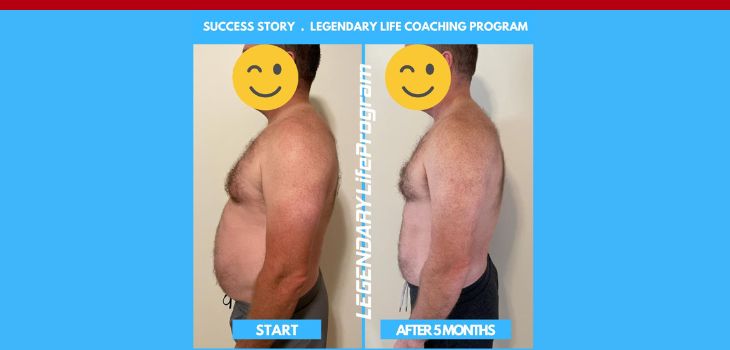Aging is a complex process, but with the right strategies, we can potentially slow it down and lead healthier, longer lives. The key is not just to live longer but to live well, with functional independence and cognitive sharpness.
In today’s Ask Ted episode, Ted is going to answer the question: “What are the top 3 science-backed things to reverse the aging process?”
He will talk about his personal journey, inspired by his father’s health challenges, and the importance of not just living longer but living well.
He will also dive into the science behind aging, will share insights about the nine identified hallmarks of aging, and will provide practical advice on three science-backed strategies to improve your health and longevity. Listen now!
You’ll learn:
- The nine hallmarks of aging and their significance
- Ted’s personal story and the inspiration behind his quest for a healthy, long life
- Three science-backed strategies to improve your health and longevity
- Tips for tracking your progress and maintaining joint health
- And much more…
Related Episodes:
500: Zone 2 Heart Rate Training: Cardio Exercise for Longevity and Performance with Ted Ryce
375: Longevity 101: How To Live Longer, Stronger & Healthier with Keith Baar
Links Mentioned:
Sign up for my Unstoppable After 40 Newsletter
Watch My FREE Body Breakthrough Masterclass
Want some help building your best body ever?
Here are 3 ways I can assist whenever you’re ready.
1) Sign up for my Unstoppable After 40 Newsletter and get an email every Friday with tips and strategies on how to transform your body and reclaim your health in record time.
2) Want to learn the simple 5-step process my high achieving clients over 40 are using to skyrocket their energy and build younger, leaner bodies while enjoying life?
Watch my brand new Unstoppable After 40 Masterclass.
3) Work with my team and me directly to reclaim your health, lose fat, and get into the best shape of your life in 2023.
Marvel at the testimonials here first, then schedule your call.
Podcast Transcription: Ted TalkWhat Are The Top 3 Science-Backed Strategies To Reverse The Aging Process? - Ask Ted
Ted Ryce: In today's Ask Ted episode, I'm going to be answering the question: What are the top three science-backed things to reverse the aging process? And if you're like this listener, you're concerned about aging well; you want to make sure you're doing the best science-backed things, this episode is for you.
What is up, my friend? Welcome to the Legendary Life Podcast. I'm your host, Ted Ryce, health expert and coach to executives, entrepreneurs, and other high-performing professionals. And we produce this show for two reasons.
The first is I've been in this business for 24 years now, and I've seen it all. I've seen it come and go, and I went down a lot of roads that led me to no results because I listened to experts at the time who were full of confidence but when I followed their strategies, I didn't get good results.
And I want to save you that trouble by sharing with you what I've learned works for myself and for my clients. I've been doing this for so long now. I want to save you that trouble.
And the second reason is I know some of you are looking for a coach to help fast track your success with your health. And so, this is a way of giving you a taste, if you are one of those people, an executive, entrepreneur, or high performer looking for a coach to help you level up, just probably how you've used coaches to level up your business, you'll know who to hire.
Or not to hire, in case you don't resonate with what I share. Either way, it's all good.
In today's episode, I want to tell you it's a bit personal for me. If you've ever wondered how I got into health and fitness, it was my dad. I remember being just maybe four years old. And I remember hanging off his bicep. Actually, my sister and I, we'd hang off his bicep; he got such a kick out of it. And we were laughing and hanging from his biceps; we thought he was so strong.
My sister was a year actually two, sorry, two years younger than me. And he had these dumbbells and other pieces of exercise equipment in our house, and I remember him going to the gym to play racquetball, and I wanted to be like my dad.
Fast forward a few decades. He also became the warning for me about how you could be in great shape, but then lose it. And the last few decades of his life, starting in his 40s and then 50s, 60s, and 70s, it was just this process of him falling apart. It started with a hip issue. Actually, it started with colon cancer in his 40s, but then it started to be a hip issue.
And then the hip issue turned into a knee issue. And then that turned into losing muscle and turned into so many issues. He eventually ended up with heart, not heart disease. Although he had that, he never had a heart attack. He had high blood pressure, which damaged his kidneys. He had heart failure, which is another type of heart disease caused by...
We don't know exactly all the things that cause it, but it seems a lack of muscle is one of the key issues, a lack of physical exercise, and in particular muscle. And in his last year, in 2020, he died on October 3rd, 2020, I saw him really just take a nosedive.
And I'm not going to recount that story. I've shared it several times on this show throughout the years. But I want to tell you, I don't want to end up like my dad. And I'm 46 now, and I want to make sure that I age well. More importantly, though, as I talked about in the beginning of the show when I said, why will you produce this show, I went, I'd listened to a lot of experts at the time. And these experts, they were full of confidence, great speakers, charismatic.
But their information was BS, and not all of it. But I didn't get consistent results, and they were so confident. And I wanted to figure out, I don't want to fall into that trap, and there are so many people today that are full of confidence about what they share, and they are absolutely wrong. I can say that now, again, I'm the expert now.
And I'll tell you, people say things, especially about aging, that are just, I will let's change the word "wrong" to "completely unproven." That's a better term, completely unproven.
So, I want to talk a little bit about aging and what we know. Because aging, at its core, it's a complex biological process where our ability to respond adaptively to environmental challenges diminishes over time. And I'll talk a little bit more. I know that might sound a bit convoluted, and I'll explain it better.
But I want to talk a little bit about the hallmarks of aging because scientists are starting to identify, hey, what is causing aging? Why is it that even if we exercise and take care of ourselves, we still fall apart? And they've so far identified nine different, what are called hallmarks of aging.
One is genomic instability. And I just want to say this, this is going to be super sciency, just try to stay with me. I'm not going to test you at the end of this, but I want you to understand where we're at with understanding the aging process.
So, number one is genomic instability. In other words, as we get older, our DNA accumulates damage. And that DNA, if you don't know what DNA does, people talk a lot about it, but DNA creates proteins in our bodies.
And if you damage the DNA, it can cause some issues with DNA's ability to create different proteins.
Number two is telomere shortening or telomere attrition. You've probably heard of telomeres before, the protective caps of our chromosomes, and they get shorter over time. And this leads to cellular aging.
Number three is epigenetic alterations. In other words, it's not the DNA itself, that's genetics. Epigenetics is which genes get turned on and off by our environment, by our behavior, by the aging process.
Number four, loss of proteostasis. So, as we age, our cells become less efficient in eliminating proteins in our bodies that are not working properly.
Number five is deregulated nutrient sensing. And listen, guys, I didn't make up these names. I know they sound complicated. They sound complicated to me, and this is my wheelhouse, science, right? Biology. So deregulated nutrient sensing. This is the efficiency of pathways related to the metabolism of nutrients in our cells. It just decreases with age.
Number six is something you've probably heard about, mitochondrial dysfunction. So, mitochondria, they're commonly referred to as the powerhouses in our cells. They become less efficient, and we also have fewer of them.
Number seven, if you're really well-read on this longevity stuff, you've probably heard about cellular senescence. In other words, older cells, you lose the ability to work properly. And we, when we're younger, we get rid of them. But as we get older, our ability to get rid of cells that aren't working properly, it leads to aging symptoms.
Eight is stem cell exhaustion. There's been a lot of talk about stem cells, and we have a reservoir of stem cells which help in regeneration, but it gets depleted over time. Something fascinating, I've had someone on about stem cells and stem cell therapies, fascinating area.
Number nine is altered intercellular communication. So, the communication between cells can become impaired, leading to inflammation and other aging-related issues.
So, listen, what I want you to take away from this is these are the nine things so far that we've identified, or scientists have identified as the hallmarks of aging. And it sounds complicated, right?
So, I want you to know that anybody who talks about aging like they figured it out or have cracked the code on longevity, they just don't know. They just don't know. We're beginning to figure out what causes aging and how best to fight it.
That said though, we have figured out some important strategies that you can implement. So right now, I'm going to dive into the top three science-backed strategies to reverse the aging process. And before I do, I just want to say this term, "Reverse the aging process," and I want to be super straight with you. I am going to use "reverse the aging process" in my marketing material. You want to know why?
Because it gets people's attention. However, there's not really a thing, it's not really a thing. Can you reverse aging? You can't go back a year or 10 years or five years, but here's what you can do. You can age well, and you can prevent preventable diseases. You can feel like you're 10 years younger, and you can certainly increase your health span as well as your lifespan.
If you don't know the difference, your lifespan is how long you will live. For example, my father's lifespan was 76 years. He died at 76, but his health span was much lower.
And that's because health span is how healthy you are. What's the way to put it? How healthy you are, how many years you're healthy out of how long you live. That's really what we're going to be focusing on.
So, strategy number one, increase your VO2 max. Have you ever heard about it? Well, it's all the rage right now to talk about. If you've listened to Peter Attia, he's done a great job of talking about VO2 max.
Also, other people as well, Joel Jameson, not as well-known as Peter, but he's been talking about it for a long time, way longer than Peter, I think.
He's a strength coach and Andy Galpin, so many great people talking about this, Andrew Huberman and myself. And what VO2Max is, it's the maximal oxygen uptake. VO2 max, that's what it stands for, maximum oxygen uptake, and it describes the maximum amount of oxygen that a person can use during exercise. And it's one of the most important indicators of cardiovascular fitness and endurance.
And what we know is this, the higher your VO2 max, the more effectively your heart and lungs can shuttle oxygen around your body where it's needed. And several research studies have shown that VO2 max is one of the strongest predictors of longevity. Having a higher VO2 max has shown associations with reduced risk of chronic diseases like heart disease, diabetes, some forms of cancer.
And most importantly, having a higher VO2 max has been shown to correlate with a lower risk of early death. So, what, okay, great. What do you do, though, to improve your VO2 max? Well, the first thing is shoot for 150 minutes of moderate-intensity aerobic exercise weekly.
That is your benchmark right there. I know that's a lot of time but it is what it is. However, let's say that you can't do that because I know some of you, you live lives where exercise is deprioritized, and you think about 150 minutes, that's 30 minutes, five times a week, really hard to do.
Hopefully not most of you are like that. But what I would tell you is this, shoot for 7,000 steps per day. That's going to give you some improvement in your cardiovascular conditioning. And if you're really on the ball, then what I want you to do is make sure some of those minutes of the 150 minutes you're spending doing high-intensity interval training. So, what you might call zone five. So, our 150 minutes of moderate intensity, that's zone two.
And if you can spend some of those minutes doing high-intensity interval training, that's going to help with your VO2 max. But I want to tell you this. I don't want to turn. I'm going to have someone on the show soon talking about the best strategies to develop the O2 max really excited to have them on. He just wrote a book on it. But what I want to tell you is this: track your progress.
The way you measure your VO2 max is you go into an exercise lab and have it measured. You can also do the Cooper test where you run as far as you can for 12 minutes. Go Google the Cooper test.
Run as far as you can for 12 minutes and then Google the description of the Cooper test; it'll tell you, okay, plug in your time and this will give you the estimate of your VO2 max, and also use wearables to monitor your resting heart rate.
I use an Oura ring; I pay attention to my resting heart rate, and I know I'm feeling my best and in the best shape when my resting heart rate hits lows in the 40s, early, low 40s, so 42, 43.
So that is number one. Number two is grip strength. And grip strength is exactly what it sounds like. It's a measure of how much force a person can generate with the muscles of their hands when they grip something. And while it may sound like kind of a strange thing, like why would someone's grip strength correlate with how long they live?
And just think about it like this, because you'll hear people talk about, oh, just do, you know, captains of crush grip strength trainers, and that's all you have to do. Because it's because the best research shows it's about grip strength, but that's not true. What we're really talking about is the fact that grip strength strongly correlates with upper body strength. So those people with lower grip strength are known to be at higher risk of having functional impairments.
In other words, you can't take care of yourself anymore. People who struggle to walk upstairs and they have to have a death grip on the banister or the, what do you call it, rail? And people who need help to put their luggage up in the overhead compartment when you're on a plane, and low grip strength, it's been linked to higher risk of all-cause mortality, cardiovascular disease, and disability. It's also been shown to decline with age, making it really important as a predictor of longevity as you get older. So, if you want to be really scientific about it, you can get a dynamometer.
You can get one on Amazon. Make sure you get a good one, not the super cheap ones. And measure grip strength.
And that'll give you an indication of where you're at, and you can even score yourself. That's what I do with my clients, by the way, and to improve your grip strength, sure you can do hand grip exercises, and I think you should.
But what I really want you to focus on is, are you doing things like seated rows, pulled ups, pulled downs? Are you doing exercises in the gym that improve your grip strength? And most of these are going to be either back exercises or arm exercises.
So, make sure you're doing exercises that strengthen your grip. Bench presses, they work your grip a little bit, but it's really about working your back muscles. Deadlifts, rows, pull-ups, pull-downs, doing bicep curls, or even triceps will strengthen your grip.
And making sure that you focus on that. Yes, it's nice to look good and build your chest muscles and other muscles, but make sure you focus on working your grip.
Strategy number three, leg strength. Like grip strength, leg strength is another known predictor of longevity. That's super important as we get older.
In fact, I remember working with a CEO client back in Miami Beach at the Continuum Condominium, if you're familiar with Miami Beach, it's a really nice condominium, and he was in his, I think mid to late sixties, and he focused on doing cardiovascular exercise.
Like we talked about, it's a good thing. VO2 Max is probably the thing that has the strongest connection with longevity based on this best evidence we have. However, he was telling me, "I'm having trouble getting into my Porsche." And I said, "Well, okay, show me your squat." And as he squatted down, even though he was a guy who rode the bike all the time, his squat looked really strange. It was like he was lacking strength.
And so, after a few weeks, because it doesn't take long to improve your leg strength, after a few weeks of training him, he was getting in and out of his Porsche no problem.
And this is something that's, you know, I should have even put this second because I think it's more important than grip strength.
I travel the world a lot, and I'll tell you I've flown around recently in Europe, going from Lisbon, Portugal to Milan, Italy, to Astuni, Italy, actually Brindisi, Italy, to get to Astuni. And I've had to walk up a bunch of it's not like in the States where you just walk through that corridor and get into the plane.
I've had to walk up steps to get into the plane carrying my luggage, and you see the people who struggle with it, they're not going to be traveling that much longer unless they do something differently. They're going to lose their ability.
So, leg strength is super important. If you've ever seen someone using a walker or using a cane, or again, they can't walk up the stairs without a death grip or someone helping them, that was kind of my dad towards the end of his life. They lack leg strength.
So, this is super important. In fact, they've done studies with 90-year-olds. And they found that actually, I'm sorry, I want to retract that, it was, it was people I think in their 80s and 90s, but they were either using walkers or using canes. I don't remember all the details of this study.
But the part that I do remember is people who are using walkers when they started doing exercises for their legs, they started using canes so they were able to upgrade to using a cane. And the people who were using canes, they stopped using them because they didn't need them anymore.
And so, what are exercises you can do for your legs? Any leg exercise, I really like to focus on things like calf raises, both reverse calf raises and regular calf raises, hamstring curls, knee extensions. Now, I haven't talked about squats, lunges and deadlifts. Those are all great too, but sometimes that's not the best place to start if you're a bit out of shape.
However, if you're already in good shape, make sure you're doing squats, lunges, deadlifts, and variations of those in your routine.
And what I also love is isometric exercises. So even if you have some injuries like I do, I don't do lunges, or at least lunges in the way or Bulgarian split squats, as a lot of my clients know that I program into their workouts, I do isometric lunges.
I do isometric squats, I do isometric deadlifts, I use a lot of isometric training. Because of some of the injuries that I have, it's better for me to maintain my function, my strength and prevent injuries compared to doing what everybody else what you see everybody else doing.
And there's nothing wrong with doing regular lunges, squats and deadlifts. I'm just saying, you may need a different approach if you have some injuries. For example, I have a client right now, he was getting a swollen knee from doing some squats and deadlifts.
So, we needed to change things so that his knee swelling will go away. So, if you're experiencing some pain, and now this is a bit of a tangent that I'm on, but I still think it's worth considering here, think it's a valuable tangent to have, make sure that you're paying attention to your joints in this process.
So, listen, just to recap here, the three best science-backed approaches to longevity are number one, improving your VO2 max. How do we do it? Cardiovascular exercise, specifically zone two and mixing in what you would call zone five, the high-intensity interval training.
Strategy number two, improving your grip strength. So, the exercises that are going to improve your grip strength the most are mostly pulling exercises and arm exercises. We're talking about, again, pull downs, pull ups, seated rows, dead lifts, Romanian dead lifts.
And the third is leg strength. And this is really important because this is going to be one of the things that affect your ability to get around, walk up the extremely steep steps of some of the places in Europe like Lisbon, Portugal or Astuni, Italy. And what do you want to do?
You want to incorporate different exercises into your routine. I like working on, I like taking a physical therapy-style approach, working on calves, hamstrings, glutes. And if you're feeling pretty good incorporating squats, lunges and deadlifts. Definitely incorporating some isometrics as well.
So, in conclusion here aging is a super complex process and we're just beginning to figure out what works what can slow aging down and help us to lead healthier longer lives.
Because the key is not just to live longer. You can take medications to do that. I think my dad extended hit he should have died in his late 60s, but blood pressure medication and other medication he was on kept him going into his 70s.
So, we want to live well. We want to live without medications. We want to live being independent, functional independence and cognitive sharpness. That's the goal here and here's the thing, you can do this, but you have to, number one, make it a priority. Number two, commit to doing something for your health, no matter what. Number three, you need the right strategies.
And if you do that, you can be like the people from, you know, the people who from blue zones who are living to 100 and beyond.
Now listen, part of that's going to be genetic, but you can live a great life but you must take action. You must do those three things. Prioritize your health. Make a commitment to doing something for your health no matter what.
And three, using the best strategies we have.
That's it for today. Thanks for tuning in to the Legendary Life Podcast. If you found this episode valuable, don't forget to share it with your friends and family. In the meantime, stay legendary and I'll catch you on the next episode.
Sign up to receive email updates
Enter your name and email address below and I'll send you periodic updates about the podcast.









